
GNU is an extensive collection of free software, which can be used as an operating system or can be used in parts with other operating systems. The use of the completed GNU tools led to the family of operating systems popularly known as Linux. Most of GNU is licensed under the GNU Project's own General Public License (GPL).

Red Hat, Inc. is an American software company that provides open source software products to enterprises and is a subsidiary of IBM. Founded in 1993, Red Hat has its corporate headquarters in Raleigh, North Carolina, with other offices worldwide.
Darwin is the core Unix-like operating system of macOS, iOS, watchOS, tvOS, iPadOS, audioOS, visionOS, and bridgeOS. It previously existed as an independent open-source operating system, first released by Apple Inc. in 2000. It is composed of code derived from NeXTSTEP, FreeBSD, other BSD operating systems, Mach, and other free software projects' code, as well as code developed by Apple. Darwin's official mascot is Hexley the Platypus.
BitKeeper is a discontinued software tool for distributed revision control of computer source code. Originally developed as proprietary software by BitMover Inc., a privately held company based in Los Gatos, California, it was released as open-source software under the Apache-2.0 license on 9 May 2016. BitKeeper is no longer being developed.

The GNU Project is a free software, mass collaboration project announced by Richard Stallman on September 27, 1983. Its goal is to give computer users freedom and control in their use of their computers and computing devices by collaboratively developing and publishing software that gives everyone the rights to freely run the software, copy and distribute it, study it, and modify it. GNU software grants these rights in its license.
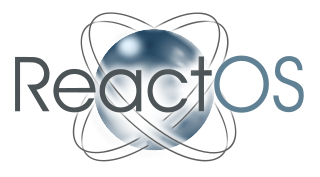
ReactOS is a free and open-source operating system for i586/amd64 personal computers intended to be binary-compatible with computer programs and device drivers developed for Windows Server 2003 and later versions of Microsoft Windows. ReactOS has been noted as a potential open-source drop-in replacement for Windows and for its information on undocumented Windows APIs.

Inferno is a distributed operating system started at Bell Labs and now developed and maintained by Vita Nuova Holdings as free software under the MIT License. Inferno was based on the experience gained with Plan 9 from Bell Labs, and the further research of Bell Labs into operating systems, languages, on-the-fly compilers, graphics, security, networking and portability. The name of the operating system, many of its associated programs, and that of the current company, were inspired by Dante Alighieri's Divine Comedy. In Italian, Inferno means "hell", of which there are nine circles in Dante's Divine Comedy.
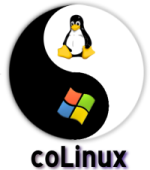
Cooperative Linux, abbreviated as coLinux, is software which allows Microsoft Windows and the Linux kernel to run simultaneously in parallel on the same machine.
Computer operating systems based on the Linux kernel are used in embedded systems such as consumer electronics, in-vehicle infotainment (IVI), networking equipment, machine control, industrial automation, navigation equipment, spacecraft flight software, and medical instruments in general.
The Common Development and Distribution License (CDDL) is a free and open-source software license, produced by Sun Microsystems, based on the Mozilla Public License (MPL). Files licensed under the CDDL can be combined with files licensed under other licenses, whether open source or proprietary. In 2005 the Open Source Initiative approved the license. The Free Software Foundation (FSF) considers it a free software license, but one which is incompatible with the GNU General Public License (GPL).
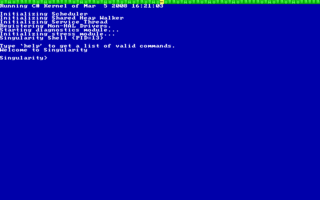
Singularity is an experimental operating system developed by Microsoft Research between July 9, 2003, and February 7, 2015. It was designed as a high dependability OS in which the kernel, device drivers, and application software were all written in managed code. Internal security uses type safety instead of hardware memory protection.
EKA2 is the second-generation Symbian platform real-time operating system kernel, which originated in the earlier operating system EPOC.

Linux is a family of open-source Unix-like operating systems based on the Linux kernel, an operating system kernel first released on September 17, 1991, by Linus Torvalds. Linux is typically packaged as a Linux distribution (distro), which includes the kernel and supporting system software and libraries — many of which are provided by the GNU Project — to create a complete operating system.

FreeBSD is a free and open-source Unix-like operating system descended from the Berkeley Software Distribution (BSD) which currently runs on IA-32, x86-64, ARM, PowerPC and RISC-V based computers. The first version was released in 1993 developed from 386BSD — the first free Unix system — and has since continously been the most commonly used BSD-derived operating system.

C# Open Source Managed Operating System (Cosmos) is a toolkit for building GUI and command-line based operating systems, written mostly in the programming language C# and small amounts of a high-level assembly language named X#. Cosmos is a backronym, in that the acronym was chosen before the meaning. It is open-source software released under a BSD license.
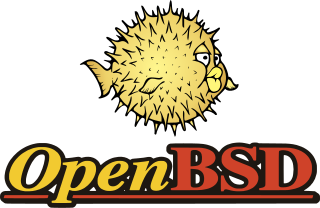
OpenBSD is a security-focused, free software, Unix-like operating system based on the Berkeley Software Distribution (BSD). Theo de Raadt created OpenBSD in 1995 by forking NetBSD 1.0. The OpenBSD project emphasizes portability, standardization, correctness, proactive security, and integrated cryptography.

The Linux kernel is a free and open source, UNIX-like kernel that is used in many computer systems worldwide. The kernel was created by Linus Torvalds in 1991 and was soon adopted as the kernel for the GNU operating system (OS) which was created to be a free replacement for Unix. Since the late 1990s, it has been included in many operating system distributions, many of which are called Linux. One such Linux kernel operating system is Android which is used in many mobile and embedded devices.
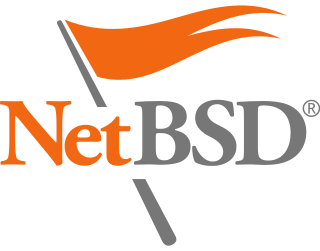
NetBSD is a free and open-source Unix-like operating system based on the Berkeley Software Distribution (BSD). It was the first open-source BSD descendant officially released after 386BSD was forked. It continues to be actively developed and is available for many platforms, including servers, desktops, handheld devices, and embedded systems.

Mono is a free and open-source software framework that aims to run software made for the .NET Framework on Linux and other OSes. Originally by Ximian which was acquired by Novell, it was later developed by Xamarin which was acquired by Microsoft. In August 2024, Microsoft transferred ownership of Mono to WineHQ.

OpenHarmony (OHOS), also known as OH by shorter acronym, is a family of open-source distributed operating systems based on HarmonyOS derived from LiteOS, donated the L0-L2 branch source code by Huawei to the OpenAtom Foundation. Similar to HarmonyOS, the open-source distributed operating system is designed with a layered architecture, consisting of four layers from the bottom to the top: the kernel layer, system service layer, framework layer, and application layer. It is also an extensive collection of free software, which can be used as an operating system or in parts with other operating systems via Kernel Abstraction Layer subsystems.















